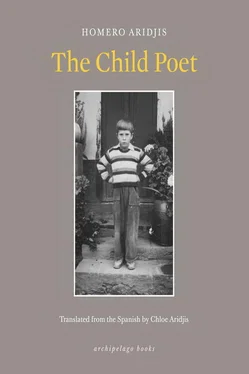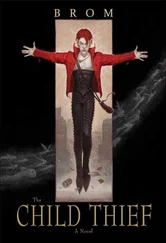Homero Aridjis
The Child Poet
MY FATHER HAS ALWAYS SAID that he was born twice. The first time was to his mother, Josefina, in April 1940, and the second time was as a poet, in January 1951. His life was distinctly cleaved in two by an accident. Before that fateful Saturday he was carefree and confident, the youngest of five brothers growing up in the small Mexican village of Contepec, Michoacán. After the accident — in which he nearly died on the operating table after shooting himself with a shotgun his brothers had left propped against the bedroom wall — he became a shy, introspective child who spent afternoons reading Homer and writing poems and stories at the dining room table instead of playing soccer with his schoolmates.
There are precious few photographs of my father before his accident. One in particular offers a tender portrait of the boy who was left behind, and the scene of his shaken paradise. Frowning in the sunlight, he kneels beside Tarzan, the first in a line of beloved dogs. On the garden wall behind them hang two of my grandmother’s many birdcages, most likely holding songbirds in midchorus.
It is of course tempting to imbue this pensive face with the intellect of the man to come. His expression is one of a heightened sensibility, his gaze fastened on something beyond the present. One senses shyness and self-assurance, a precocious gravitas but also vulnerability. The truth is, I will never really know who my father was at the time. Nor will he. After the accident his early childhood became like a locked garden.
And then, in 1971, the memories found a way out. As soon as my mother became pregnant with me, visions from this elusive period started returning to my father in astonishingly vivid dreams, giving shape to what would become El poeta niño , a celebration of his life before 1951. Imminent fatherhood helped revive memories that had, for two decades, lain dormant.
This work, narrated in a succession of interconnected vignettes, has provided me with a portrait of my father in his pre-poet years. I have grown to know the child at a time when sights and sensations were still delivered at their purest, when each day brought new perceptions of his mother and his father, when every villager in Contepec formed part of a personal mythology. It was a time when shadows were palpable and light had a sound of its own.
I began work on El poeta niño in a translation class at Harvard in autumn 1993. After translating half the book for my course, I was keenly encouraged by my professor to translate the other half. For mysterious reasons of the psyche — perhaps I needed to write my own book first — it took twenty years for me to complete the task.
Now, as then, translating my father’s text has been an exceptional experience. This has always been one of my favorite works of his, and the fact that its gestation was parallel to my own makes it especially poignant. And its main themes — childhood reverie and artistic solitude and apartness — were ones that would preoccupy me for years to come.
The structure of the book — vignettes — remains faithful to the method of composition, a sequence of loosely related dreams. Many of the passages stand on their own but they also form part of the larger mosaic of childhood reverie. After all, the language of the child, as Gaston Bachelard has described at length, is a language of images that acquire an oneiric quality when returned to later in life. “We dream while remembering. We remember while dreaming.”
There is certainly a forward movement to these pages and a distinct rhythm that emerges, but more than anything, it is a celebration of the image and its reverberations. For this is the cadence of reverie, and of a time when one’s perception of the world arrives in fragments. I tried to preserve the poetic simplicity of the child narrator and remain faithful to his rendering of the world around him, opting for words that suited a younger vocabulary.
I also had to accept the strangeness of having Mexican characters converse in English, and of reconstructing such a determinedly Mexican village and landscape in another language. My grandparents, their house, the main square, the village cemetery: coordinates from my own childhood, engraved in my mind long before I’d read the book. I was confronted with the transformation of a place and a people I knew intimately into characters inhabiting a literary landscape. Yet the themes, albeit explored within the frame of a small Mexican village in the 1940s, are universal.
My father never intended to write El poeta niño ; it was created out of the necessity to retrieve his childhood. I once asked him about the actual process of writing the book. Because all memory is relative, he replied, it was difficult to avoid modifying his memories. They are vulnerable to subsequent experience and of course to the language in which they are lived and acquired and later recorded. Not to mention that the very act of transforming dreams into text is in itself a form of translation, and at best an approximation of the original. While writing, my father became a reader of his dreams, and while putting them to paper, he could not help but interpret them as well.
So perhaps this is a translation at twice remove; even so, I hope to have captured some of the mystery and wonder of my father’s childhood, the childhood that made him a poet.
CHLOE ARIDJIS
Not a footstep was to be heard on any of the paths. Somewhere in one of the tall trees, making a stage in its height, an invisible bird, desperately attempting to make the day seem shorter, was exploring with a long, continuous note the solitude that pressed it on every side, but it received at once so unanimous an answer, so powerful a repercussion of silence and of immobility that, one would have said, it had arrested for all eternity the moment which it had been trying to make pass more quickly.
MARCEL PROUST, Swann’s Way
TO SUCKLE. The world was an immense tit, a mountain the size of my mouth. Fingers. Pacifiers. Suction. Female faces with a maternal presence. White instants. Milky light.
The concave hour. The warm crib. And I, center of the room, awaiting the punctual breast, which would transmit to me, like a cornucopia, life itself.
Her breast, like a supple moon or bread, flinched at my bite; between my hands, which lifted it bare to my lips and savored it hungrily.
A brimming cup, it would separate in a soft incarnation from the chest that bore it.
Enveloped in the morning light, from which I suckled brightness. And it was a sun to grasp, my face burying itself in its landscape.
My mother’s footsteps in the corridor. A door opening or closing. Rain on the roof.
My thoughts drifted towards my father in his store. I imagined him entering the room, sitting down on the edge of the bed, and remaining by my side.
But he didn’t. And all of a sudden I would find myself calling out “ ¡Papá! ¡Papá!” knowing well that as soon as he heard me he’d drop everything and come at once.
And he did. He would sit down by my side and I would watch him, in his fabulous existence, until I fell asleep again.
In darkness I would awaken, not knowing on which side of the bed I was lying. And, feeling the emptiness before me, I would grope around, in search of another comfortable position.
Finding the pillow meant finding the place where my head should have been. But just when I thought I had, I found myself touching the other end of the bed.
I felt battered, full of shadows and confusion, unable to wake up altogether, unable to fall back asleep.
Читать дальше












